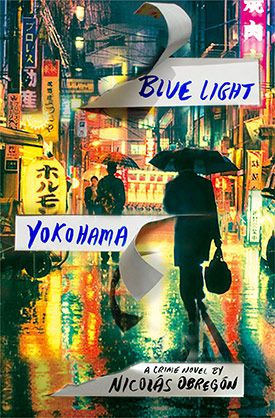
Slogans, symbols, and suicide. Are they connected? If so, how?
“This is what Japan should be,” insists an insurance company slogan. “Creating Tomorrow Together,” boasts another. Vivus Construction offers, “The Good Life.”
But it’s not just companies that encapsulate their mission statements in catchy phrases and pithy sayings. A new religious movement is sweeping Japan, and bible quotes are on everyone’s lips. “The lord is my light and my salvation. Whom shall I fear?” When does scripture become slogan?
And what are we to make of the oft-repeated line, “The lights of Tokyo are so pretty”? Is that a reference to the soothing blue lights being installed on the subway lines in an attempt to lower the suicide rate? And what of the black sun symbol that appears in the book’s opening, when a severely troubled woman commits suicide, and then reappears at the sight of a particularly grisly murder?
That murder has connections to the suicide that opens the book, an event that involved a police inspector who has now committed suicide himself. His successor—an outsider that nobody wants in Tokyo, much less working the case—is left to track down the significance of all these bits and pieces that he’s certain are connected. Because this is Tokyo, and everything is connected.
The Tokyo cityscape stretched out below him, cities within cities, angles incalculable. Thirty-five million existences crammed into circadian rhythms of concrete and cables. Immense infrastructure, never-ending networks—all of it delicate as hummingbird heartbeats.
“Tokyo is a million cities and one city all at once,” muses a cop, and Iwata—the haunted, American-educated detective who has inherited the work of the “Black Sun Killer”—can only assume that he’s living in one of the worst cities in the city. The crime’s he’s investigating are gruesome. And the people he’s investigating? They’re not nice people.
The room smelled of cigar smoke, aftershave, and feet. A small, smiling man in his fifties with thick, black hair slicked back sat at a bureau too big for him. His spectacles were too small for his wide, coin-like face.
“Yes?”
His voice was inquisitive, pleasantly surprised at the young woman standing before him. When Sakai held up her police credentials, his expression did not change.
“Assistant Inspector Sakai. Division One.”
“My name is Gorō Onaga. Please sit.”
Signed portraits of Jean-Marie Le Pen and Saddam Hussein sat on Onaga’s desk, facing outward toward the visitor. Another photograph showed Onaga warmly embracing the former Minister for Security. Above his chair, a huge portrait of Yukio Mishima, handsome and muscular, looked down at Sakai. Beneath the author’s folded arms ran a quote of his in severe, dark text.
PERFECT PURITY IS POSSIBLE IF YOU TURN YOUR LIFE INTO A LINE OF POETRY WRITTEN WITH A SPLASH OF BLOOD.
Nicolás Obregón is a British-Spanish writer who has infused his first novel with a kinetic sense of the many different sides of a city he loves. Like a kaleidoscope, the view shifts from angle to angle as the inhabitants try to impose order on the chaotic infrastructure. “Truth. Sincerity. Respect. Love,” reads one slogan, and in the end, Iwata’s life comes down to those four words.
Fans of noir will delight in the tough-edged dialogue and the unsentimental characters. The puzzle is solid, and the investigation absorbing. And all the suicides, slogans, and symbols are explained. Obregón is definitely an up-and-coming writer to watch.
Read an excerpt from Blue Light Yokohama!
To learn more or order a copy, visit:
opens in a new window![]() opens in a new window
opens in a new window![]()
Katherine Tomlinson is a former reporter who prefers making things up. She was editor of Astonishing Adventures Magazine and the publisher of Dark Valentine Magazine. She edited the charity anthology Nightfalls. Her dark fiction has appeared in Shotgun Honey, A Twist of Noir, Luna Station Quarterly, and Eaten Alive, as well as anthologies, including Weird Noir, Pulp Ink 2, Alt-Dead, Alt-Zombie, and the upcoming Grimm Futures, which she also edited. Her most recent collection of short stories is Suicide Blonde. She sees way too many movies.

And while you hear a lot of goodwill for King Charles III, the sentiment is just not the same.